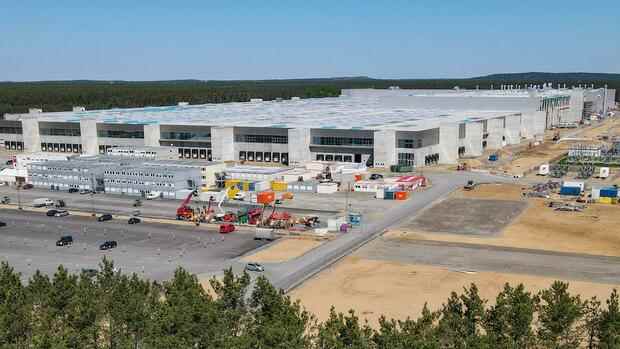Berlin The director of the CAR Center Automotive Research, Ferdinand Dudenhöffer, sees the new delays in the start of regular production at the Tesla factory in Grünheide as a negative sign for Germany as a business location. “Tesla shows the world how we stand in our own way,” Dudenhöffer told Handelsblatt.
Tesla should have “proceded more intelligently” when approving the battery factory and not “started up the German court machine” by “submitting” documents later, the industry expert said. “But such hurricanes of resistance show how little sustainable Germany is.” The “legal and administrative urge” have made Germany a country in which the “right to standstill” applies.
Around two years ago – on February 13, 2020 – the first trees were felled on the Tesla site, and the car factory is now up. According to the Ministry of the Environment, the approval process will take some time – and even after the decision, Tesla must meet other requirements.
According to Tesla boss Elon Musk, the first cars should roll off the assembly line as early as 2021. Environmentalists and local residents have raised hundreds of objections, including because of environmental risks they see and the water use at Musk’s car and battery plant.
Top jobs of the day
Find the best jobs now and
be notified by email.
In view of the developments at Tesla, the industry expert is concerned about further projects in Germany. The delays in Grünheide showed, for example, for the climate offensive by Federal Minister of Economics Robert Habeck (Greens), how immense the risk of failure is here too. The same applies to the renewal of motorway bridges, “some of which need decades to be built with completely new approval procedures,” said Dudenhöffer.
The industry association BDI also expressed concern. Chief Executive Holger Loesch called on the federal government to finally create simpler and faster planning and approval procedures for the urgently needed conversion of industrial plants in order to achieve the climate goals.
>> Read here: Interview with Brandenburg’s Economics Minister: “Elon Musk is a total workaholic – I don’t know when the man sleeps”
The association expects the approval procedures for wind turbines and industrial plants to double over the next eight years. Federal and state authorities would each have to issue around 20,000 permits for industrial plants and wind turbines by 2030. “This mammoth task can only be mastered with a comprehensive reform of planning and approvals that includes processes for industrial plant structures,” said Loesch.
Environmental economist Claudia Kemfert from the German Institute for Economic Research (DIW) also sees an urgent need for action. However, simplified and accelerated procedures should “not be at the expense of standards, especially environmental standards,” Kemfert told the Handelsblatt.
The industry expert criticizes the German bureaucracy.
(Photo: CAR)
The simplification and shortening of planning procedures had already been formulated as an important goal in the traffic light coalition agreement – among other things, to accelerate the expansion of renewable energies. The aim is to halve the duration of the procedure. FDP leader and Federal Finance Minister Christian Lindner has announced concrete proposals for the first half of 2022.
BDI: Reduce procedure time by at least 75 percent
The BDI called halving the duration of the procedure “completely insufficient”. There must be a reduction of at least 75 percent. This is the only way to ensure the necessary investments and achieve the climate goals. “Procedures that are delayed cost companies money and competitiveness,” said Loesch. Above all, energy-intensive industries such as steel, chemicals and cement would have to be completely rebuilt in order to become climate-neutral.
A proposal by the Brandenburg Economics Minister Jörg Steinbach (SPD) was well received in the traffic light coalition. In view of the sluggish Tesla process, he had explained: “It should be possible to make changes to the building plan in the ongoing approval process without having to start the process all over again.”
The Parliamentary State Secretary in the Federal Ministry of Transport, Oliver Luksic, sees it the same way. “It is crucial that we become significantly faster in all areas – both the approval of industrial plants and transport infrastructure projects,” said the FDP politician to the Handelsblatt. “This also includes the fact that project changes must be able to be processed quickly during the ongoing process, without restricting participation rights and the necessary technical examinations.”
More: Setback for Musk’s SpaceX: Solar storm destroys 40 of 49 Starlink satellites

